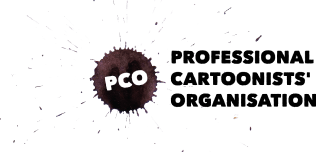The future of the newspaper editorial cartoon
Former editor of The Guardian, Peter Preston has written a piece in The Observer newspaper bemoaning the decline in numbers of editorial or political cartoonists being used in newspapers. You can read it here. Preston focuses on recent job losses in the United States, which mirror the speedy decline of the print media there, but […]
Cartoon Pick of the Week
Bloghorn spotted this great work during this week ending the 28th August 2009. One: Alexander Matthews in Private Eye: a new version of King Kong Two: Stan McMurtry, aka Mac, in the Daily Mail: Strictly Joe Calzaghe Three: Matt Pritchett in the Daily Telegraph: Jacko Latest The PCO: Great British cartoon talent Subscribe to The […]
Artist of the Month – Steve Bright
In our last question for August, Bloghorn asked our Artist of the month, Steve Bright, what is the future of cartooning in the digital age? I think (with some sadness) that the future of cartooning IS the digital age. Not only do I supply almost all of my artwork in digital format these days (and […]
Team Bloghorn announced!
Clive Goddard, Andy Bunday and Nathan Ariss will be representing the PCO in the form of Team Bloghorn at this year’s Big Draw Battle of the Cartoonists challenge on Saturday 12th September, 2-5pm at the Idea Generation Gallery, 11 Chance Street, London E2 7JB (map). Team Bloghorn is understood to be up against Dave Brown’s […]
The Genesis of Robert Crumb
This autumn sees the long-awaited release of an adaptation of the Book of Genesis by underground comics legend Robert Crumb. Yes, it’s the Bible with “adult supervison recommended” on the cover. You can expect to see some “controversy” in the mainstream media about this. People who like to be “up in arms” about things will […]
Artist of the Month – Steve Bright
The PCO Artist of the month for August is Steve Bright and Bloghorn asked him which other cartoonists’ work he admired. There are far too many names to list here, and yet I’m neither a follower nor expert in any other cartoonist’s work. I have a few books by other cartoonists I enjoy, but no […]
Amazon announces Comic Strip Superstar contest
Internet book retailer amazon.com and US comic publisher Andrews McMeel Publishing have launched a new contest to search for a new Comic Strip Superstar. Following two elimination rounds a panel of comic strip luminaries including Doonesbury‘s Gary Trudeau will select 10 finalists, and the winner will be picked by a vote by amazon.com customers. The […]
Shrewsbury festival gets spooky
The organisers of the Shrewsbury Cartoon Festival have announced the theme for next year’s event: magic, myths and the paranormal. PCOer Roger Penwill, the Chairman of the festival, told Bloghorn: “After finding the humour in earthly subjects in the six previous festivals this will be the opportunity for cartoonists, with their fertile imaginations, to look […]
Cartoon Pick of the Week
Bloghorn spotted this great work during this week ending the 14th August 2009. One: Matt in the Daily Telegraph on US attacks on the NHS Two: Paul Thomas in the Daily Express on the stand-in Three: Tim Sanders in The Independent on Clinton in Korea The PCO: Great British cartoon talent Subscribe to The Foghorn […]
